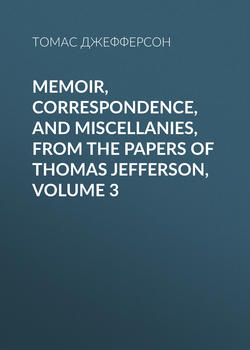Читать книгу Memoir, Correspondence, And Miscellanies, From The Papers Of Thomas Jefferson, Volume 3 - Томас Джефферсон, Thomas Jefferson - Страница 5
LETTER V.—TO JOHN JAY, August 5, 1789
ОглавлениеTO JOHN JAY
Paris, August 5, 1789.
Sir,
I wrote you on the 19th of the last month, with a postscript of the 21st; and again on the 23rd and 29th. Those letters went by private conveyances. This goes by the London post. Since my last, some small and momentary tumults have taken place in this city, in one of which a few of the rioters were killed by the city militia. No more popular executions have taken place. The capture of the Baron de Besenval, commandant of the Swiss troops, as he was flying to Switzerland, and of the Duke de la Vauguyon, endeavoring to escape by sea, would endanger new interpositions of the popular arm, were they to be brought to Paris. They are, therefore, confined where they were taken. The former of these being unpopular with the troops under his command, on account of oppressions, occasioned a deputation from their body, to demand justice to be done on him, and to avow the devotion of the Swiss troops to the cause of the nation. They had before taken side in part only. Mr. Necker’s return contributed much to re-establish tranquillity, though not quite as much as was expected. His just intercessions for the Baron de Besenval and other fugitives, damped very sensibly the popular ardor towards him. Their hatred is stronger than their love.
Yesterday, the other ministers were named. The Archbishop of Bordeaux is Garde des Sceaux, Monsieur de la Tour du Pin, minister of war, the Prince of Beauvou is taken into the Council, and the feuille des bénéfices given to the Archbishop of Bordeaux. These are all the popular party; so that the ministry (M. de la Luzerne excepted) and the Council, being all in reformation principles, no further opposition may be expected from that quarter. The National Assembly now seriously set their hands to the work of the constitution. They decided, a day or two ago, the question, whether they should begin by a declaration of rights, by a great majority in the affirmative. The negatives were of the Clergy, who fear to trust the people with the whole truth. The declaration itself is now on the carpet. By way of corollary to it, they last night mowed down a whole legion of abuses, as you will see by the Arrêté which I have the honor to inclose you. This will stop the burning of chateaux, and tranquillize the country more than all the addresses they could send them. I expressed to you my fears of the impractibility of debate and decision in a room of one thousand and two hundred persons, as soon as Mr. Necker’s determination to call that number, was known. The inconveniences of their number have been distressing to the last degree, though, as yet, they have been employed in work which could be done in the lump. They are now proceeding to instruments, every word of which must be weighed with precision. Heretofore, too, they were hooped together by a common enemy. This is no longer the case. Yet a thorough view of the wisdom and rectitude of this assembly disposes me more to hope they will find some means of surmounting the difficulty of their numbers, than to fear that yielding to the unmanageableness of debate in such a crowd, and to the fatigue of the experiment, they may be driven to adopt, in the gross, some one of the many projects which will be proposed.
There is a germ of schism in the pretensions of Paris to form its municipal establishment independently of the authority of the nation. It has not yet proceeded so far, as to threaten danger. The occasion does not permit me to send the public papers; but nothing remarkable has taken place in the other parts of Europe.
I have the honor to be, with the most perfect respect and esteem, Sir, your most obedient and most humble servant,
Th: Jefferson.
